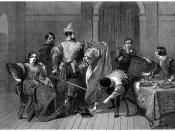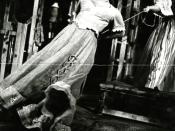The Taming of the Shrew: The Importance of Disguise
Have you ever wished you could be somebody else? Shakespeare, who was one of the greatest writers of all time, told a story that everyone can relate to. Throughout one's life, there is at least one point in time where one wishes they could be someone else. In The Taming of the Shrew, Shakespeare showed that not only was this possible, but it was a reality. This story describes what it was like to live in Shakespeare's day by demonstrating every action of each character and how different elements, such as disguise play into that. Throughout The Taming of the Shrew, disguise played a large part. It allowed one to not only change their clothes or personality, but their social position as well, even if it was just for a moment. Throughout the play, Shakespeare demonstrated that disguise can be either beneficial or detrimental, specifically in the case of Lucentio and Hortensio.
There were numerous different disguises discussed within the pages of The Taming of the Shrew. Many of these disguises seemed to be beneficial, yet there were the few that were detrimental. There were also a couple that looked beneficial in the beginning, but actually weren't. Lucentio, who was an aristocrat, became a lowly Latin tutor named Cambio (1.1.213). Lucentio did this all for his love of Bianca and ended up having one of the most beneficial disguises. Tranio, who was Lucentio's servant, disguised himself as Lucentio to play one of Bianca's suitors (1.1.213). This disguise was helpful in that it allowed Lucentio to marry Bianca (5.1.120). Hortensio, who seemed to be an aristocrat, disguised himself as a music teacher named Litio. This was a mistake on his part because it was only for selfish reasons and not...


